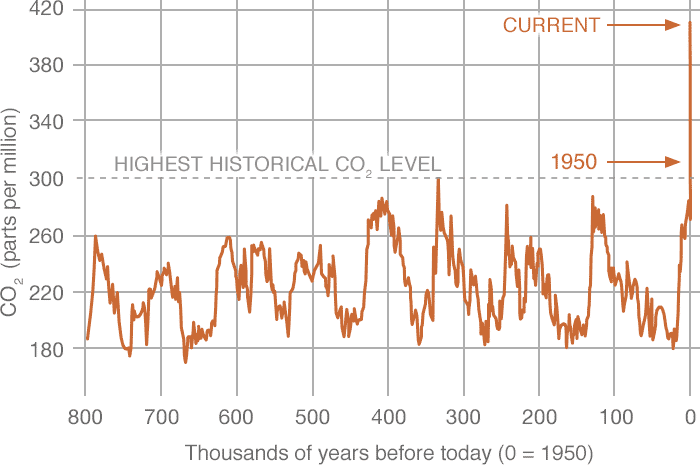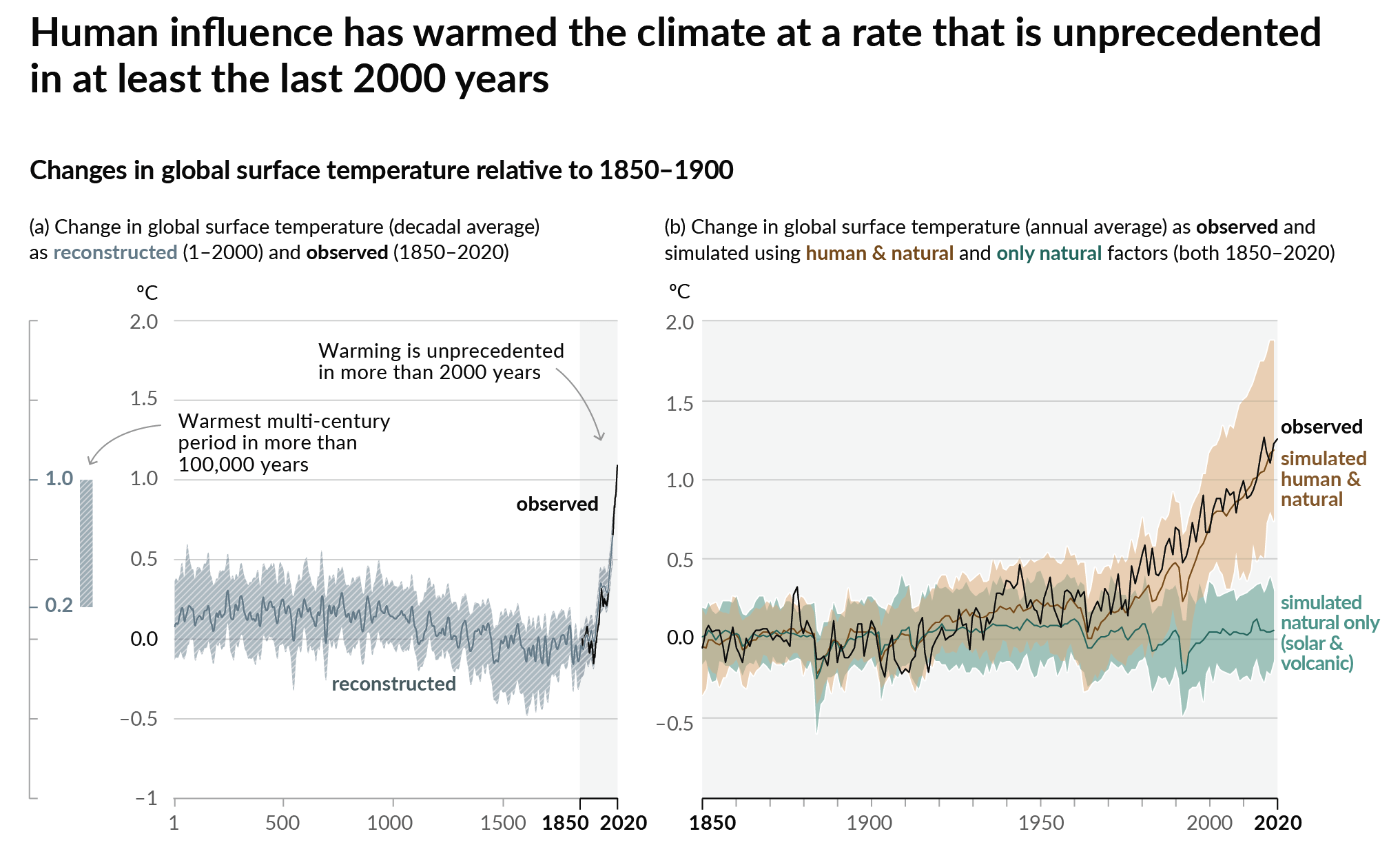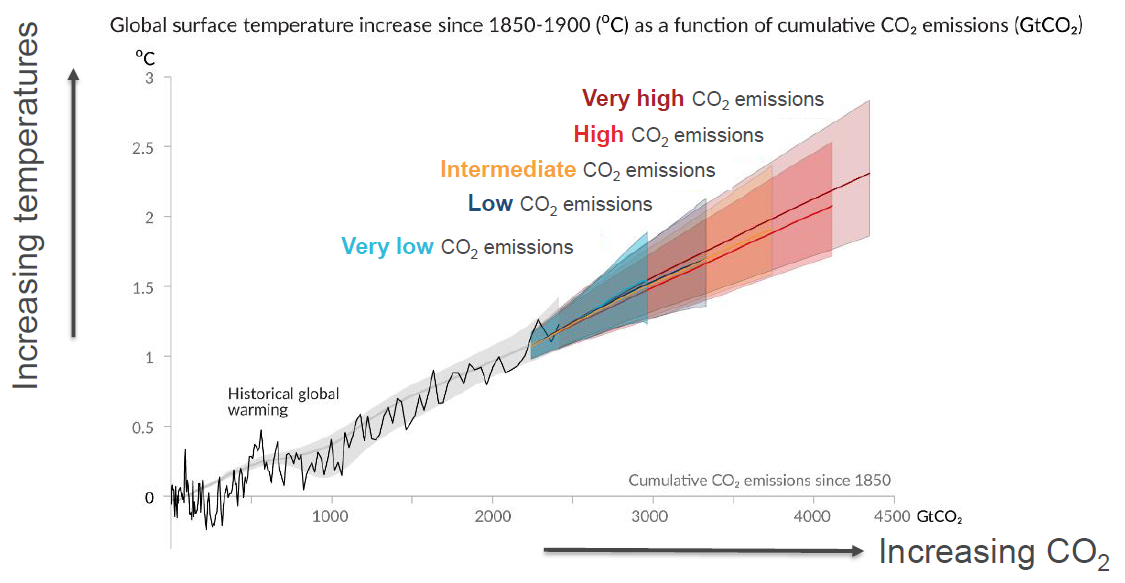
Mankind has changed the climate
The world has warmed on average by 1.1°C.
The scientific consensus is that
- this is caused principally by mankind's emissions of greenhouse gases (especially CO2) released into the atmosphere
- levels of CO2 have increased steadily since mankind started burning fossil fuels in large quantities.
- the temperature rise is in line with what is predicted by scientists from what is known about the atmosphere.
- future emissions will cause additional warming and further effects on the climate and people
- the larger the total emissions, the greater the warming
- unless there are immediate, rapid, and large-scale reductions in greenhouse gas emissions, limiting warming to 1.5°C will be beyond reach.
Levels of CO2 have increased since the burning of fossil fuels started
Levels of CO2 have increased steadily since mankind started burning fossil fuels in large quantities: |
Source: Nasa [1] |
As the atmospheric CO2 has increased, so has the temperature
The average temperature rises are in line with what is predicted by scientists from the increase in CO2 levels and what is known about the atmosphere. |
Source: IPCC AR6 WG1 SPM report [2] |
Future emissions will cause additional warming
As more CO2 is added to the atmosphere, the temperature will rise.Every tonne of CO2 emissions adds to global warming.

Source: IPCC [3]
To be confident of keeping global warming to 1.5°C, further emissions need to be limited to 400 billion tonnes CO2 (400 Gt CO2). This global CO2 budget runs out in 2030 at current emission rates - see document 54.
Unless there are immediate, rapid, and large-scale reductions in greenhouse gas emissions, limiting warming to 1.5°C will be beyond reach [4].
Other greenhouse gases
CO2 is the main greenhouse gas causing global warming. Other greenhouse gases are- methane
- nitrous oxide
- halogenated gases
Methane is second in importance of the greenhouse gases. A key point is that CO2 persists in the atmosphere for centuries or millenia, whereas methane persists in the atmosphere for only a decade of two, so most attention is given to CO2.
Sources
The information presented here is the scientific consensus, i.e. the conclusions of people who have engaged in rational collaborative discussions.The main source for this scientific consensus is the IPCC AR6 WG1 report of August 2021 - see document 51.
Alternative views
Not everyone accepts the scientific consensus given above. Some common objections are scrutinised and countered at the website https://skepticalscience.com.References
| [1] | NASA https://climate.nasa.gov/vital-signs/carbon-dioxide/ (accessed 29 Oct 2022) |
| [2] | Summary for Policymakers (SPM) of the Working Group I (WGI) contribution to the Intergovernmental Panel on Climate Change (IPCC) Sixth Assessment Report (AR6) (2021) https://www.ipcc.ch/report/ar6/wg1/downloads/report/IPCC_AR6_WGI_SPM.pdf For more information on the IPCC and its 2021 report, see document 51 |
| [3] | IPCC press conference slides (Aug 2021): https://www.ipcc.ch/report/ar6/wg1/downloads/outreach/IPCC_AR6_WGI_Press_Conference_Slides.pdf |
| [4] | Abdalah Mokssit (Secretary of the IPCC) (Aug 2021) IPCC press conference https://un-spbf.org/event/ipcc-press-release-climate-action-cannot-wait/ |
First published: Feb 2019
Last updated: 1 Sep 2023

 ✖
✖